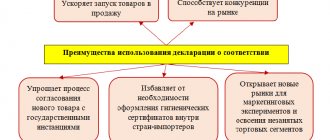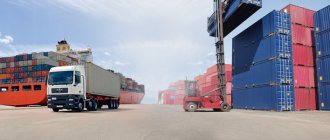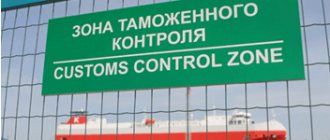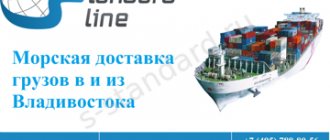Customs clearance of export
is carried out at Federal Customs Service posts in the region of the sender of the goods. To complete the procedure, it is necessary to present the cargo to customs officers, declare it and make mandatory payments. Presentation is the initial stage. Its purpose is to notify customs officers about the arrival of a cargo shipment. The legal entity is given 30 minutes to do this, which means that the shipped products must be shown at the request of the Federal Customs Service. The carrier is responsible for the safety of the goods. He has no right to leave the vehicle or move around the parking lot without permission. Next comes customs declaration (the so-called customs clearance). TD contains information about foreign trade transactions and exports. The form must be filled out in block letters. Corrections are not allowed. The last step is to pay export duties and fees.
Export operations occupy a significant niche in the foreign economic activity of the Russian Federation. Organizations that export goods must regularly monitor their unimpeded passage across the Russian border for further delivery to foreign countries. To do this, it is necessary either to maintain a staff to work with customs authorities, or to look for a reliable customs broker.
Firms that have been carrying out export operations for many years know what they are dealing with. But it won't be easy for beginners. Most often, when going through customs procedures, they do not take into account many nuances, and delays occur and the consignment of goods gets lost. To avoid any unpleasant surprises, it is better to seek help from professionals. Customs broker Bodrus LLC can become a reliable assistant.
Clearance of customs exports in Russia
The procedure for registering the export of goods in Russia has a number of features. If when importing goods, regulatory authorities pay great attention to assessing its value, then when exporting they are more interested in the formal side of the issue, namely, permits:
- When exporting agricultural products, phytosanitary documents are required
- export of intellectual property must be accompanied by permits from the copyright holder
- goods of cultural significance (paintings, antiques, etc.) can only be exported if there is a certificate from the Ministry of Culture of the Russian Federation, which indicates that these items are not of cultural value
- livestock products are not released beyond the customs border without veterinary certificates confirming their safety
- export of seeds is impossible without the conclusion of the Seed Fund of the Russian Federation
- products of the military-industrial complex are produced abroad only with the permission of the Ministry of Defense of the Russian Federation
These are just a few examples, which, however, clearly demonstrate that strict requirements are imposed on the export of goods from the Russian Federation. You can find out exactly what documents are required to export cargo from Russia from the specialists of the Major company.
What does export mean?
Keep records of exports and imports using the simplified tax system in the Kontur.Accounting web service.
Currency accounting and work instructions, taxes, automatic payroll calculation and reporting in one service Get free access for 14 days The concept of “export” is many centuries old: it comes from the Latin “exporto”, which means “to export from the port”. In ancient times, trade between city-states was tied to sea, river routes and ports, and thus the concepts of “import” (to the port) and “export” (from the port) arose.
Today, export is the removal from the territory of the state of goods, services, works, intellectual property and exclusive rights to it - without the obligation of re-import into the country. The fact of export is registered when the cargo crosses the customs border of the state, when transferring rights to the results of activities and when providing services. There are also export operations that do not mean the export of goods abroad: for example, when a foreign citizen purchases goods from a Russian partner for resale to another Russian person.
Export is associated with the international division of labor and agreements between countries on scientific, technical and industrial cooperation, exchange of licenses and patents. The domestic market is limited, so all countries need export operations to sell goods and services.
Customs clearance of export cargo: procedure
Customs clearance of export cargo is regulated by a special collection of documents - the EAEU Customs Code. Conventionally, the entire complex of procedures can be divided into 3 stages:
- Notification and provision of cargo for inspection. Notification of the cargo being submitted for inspection must be sent no later than 30 minutes before its actual arrival. This responsibility rests with the cargo owner. He has the right to transfer it to a freight forwarding company, a customs broker, a customs terminal or a temporary storage warehouse. In this case, after submitting a notice, it is prohibited to move goods inside the container, as well as leave the vehicle without constant supervision.
- Declaration. As a rule, at this stage, specialists are involved - customs brokers or declarants. The main document at this stage is the export customs declaration - this is a special form with various degrees of protection, which contains the characteristics of the cargo, its weight, data on the number of packages, the recipient and sender, customs value and a whole range of other information
- Physical inspection of cargo. At this stage, the actual reconciliation of cargo and documents, payment of customs duties and fees is carried out. If all documents are completed correctly and the cargo does not raise any questions, then the necessary stamps are placed and the cargo is released from the customs post
What will be the benefit of cooperation with a customs broker?
Cooperation with the customs broker "KVT" will significantly influence:
- For the deadlines for performing actions provided for by the export customs clearance procedure. Our specialists will help minimize the period of time required to resolve these issues.
- For unhindered export of products of any type and purpose. Proper execution of export documents will ensure that cargo crosses the border without delays or delays. It will also eliminate possible unpleasant consequences that arise from incorrect customs clearance of cargo.
- The amount of financial costs associated with exporting products. Our experts will be able to recommend the most optimal export routes and, accordingly, the best options for customs clearance of cargo.
Another advantage that you get when using our services is that you have up-to-date information regarding any innovations that constantly appear in the customs field. The new conditions for export customs clearance will not come as a surprise to you if you cooperate with KVT.
Customs clearance of exports from Russia: documents
Customs clearance of exports from Russia requires a huge amount of documents. Depending on the category of cargo, the list may expand due to various certificates, permits, etc. However, there is a list of required documents:
- an invoice or account against which the delivery of goods is paid. This also includes documents confirming other overhead costs, for example, transport
- packing list. This document contains information about the quantity of goods in large containers and its full name
- waybills if the cargo is delivered to the customs post by road or rail
- documents confirming the shipper's right to own the cargo. These include a purchase agreement, a certificate of ownership and a special certificate of origin
- licenses, certificates and other permits issued by competent authorities for a particular category of goods
Export of goods
Customs statistics divide exports into special and general.
Special export implies:
- export from the territory of the country of goods of domestic origin that are produced, grown, mined or processed within the country (therefore, this type of export is also called “national”);
- export of goods imported into the country and processed on its territory;
- export of goods of foreign origin that have been “nationalized,” that is, they have entered into free circulation within the country (have undergone customs clearance and been declared for internal use).
Total exports include all “special” groups, plus the export of goods of foreign origin from the territories of free zones and from assigned customs warehouses.
Here are the TOP 10 goods exported from Russia:
- mineral raw materials, minerals - more than half of the export volume;
- metals and products made from them;
- chemical products;
- machines, engines, equipment;
- plant products and raw materials;
- jewelry;
- wood and wood products;
- plastics, rubber and caoutchouc;
- products of animal origin;
- pharmaceuticals.
Advantages of service from Major
The transport and logistics company Major has been included in the register of customs representatives of Russia for more than 15 years and is included in the National Association of Customs Representatives. We opened 37 of our own representative offices throughout the country and entered into more than 200 agreements with foreign partners. Our clients are the largest companies in Russia and abroad. The geography of cargo transportation is 180 countries.
Major is a modern and effective quality management system that meets the requirements of GOST ISO 9001-2011. Thanks to this organization of work, we quickly receive feedback from clients, regularly conduct KPI assessments of employees and departments, and optimize business processes. All these activities are aimed at constantly improving the quality of the services offered. At the same time, the company's pricing policy remains customer-oriented.
Transport and logistics company Major offers a wide range of services related to export customs clearance. By contacting us, the client receives:
- professional advice from an experienced customs broker
- a personal manager ready to answer any question related to the client’s cargo
- prompt and competent clearance of goods and raw materials exported from Russia by any type of transport
- preparation of all necessary documents including waybills
- legal support for customs clearance on the territory of almost any customs post in the Russian Federation
- access to the electronic document management system
- a customs card that allows you to quickly make payments and settlements
- defending the customs value of cargo before regulatory authorities
Delivery
Cooperation with is not only a reliable, but also a fast alternative to independently processing documents and delivering cargo.
We organize door-to-door delivery - we will take care of choosing the transport scheme, issuing documents, and controlling the quality. Our employees submit documents exactly within the deadline established by law.
With our help, you release a batch of goods without delays - you make a profit on time.
Export registration
Get a free consultation
Call us or fill out the feedback form and our employees will contact you for a detailed discussion.
8 800 700 0952 Feedback
Additional services
In addition to export customs clearance services, Major offers its clients additional services. Don't miss the opportunity to save yourself from unnecessary hassle. We offer:
- organization of state security. Your cargo will be completely safe anywhere in the country
- transportation of goods of any category. Oversized, dangerous, general, prefabricated, termite - we will transport any product or raw material
- organization of buffer, transit and warehouse storage on its own territory
- delivery of cargo to the territory of the final addressee in Russia
- outsourcing of foreign economic activity. Documentary and legal support for foreign trade activities, payment of invoices under foreign exchange contracts, etc.
This is not a complete list of the services that we are ready to provide to clients. Leave your request, and the Major manager will tell you in more detail about our capabilities.
Export difficulties
Keep records of exports and imports using the simplified tax system in the Kontur.Accounting web service. Currency accounting and work instructions, taxes, automatic salary calculation and reporting in one service Get free access for 14 days
Researching new markets and finding partners requires funds. You will have to respond to the demands of foreign consumers and make changes to products or services. Products may need to be modified due to foreign regulations. New expenses appear: customs duties, excise taxes. Accounting becomes more complicated: you will have to open foreign currency accounts and monitor exchange rate differences.
How many days to wait for import?
On the way from China, your parcel will have to wait for one stage, which Aliexpress buyers call the “Bermuda Triangle”. And in fact, the parcel is being exported, and the tracking statuses do not change for some time. And visually it seems that the parcel has simply disappeared somewhere. Moreover, the postal company that transported your order to the border no longer has information about the parcel, since they handed over the parcel and it will then be sent by local mail. But the local post office does not yet have information, since the parcel has not yet reached them.
Of course, the question immediately arises, how many days do you need to wait from export to import? Which deadlines are considered normal, and which already indicate that the package is stuck and something needs to be done.
Let's look at the official documents. In the regulations of the Universal Postal Union, the standard time frame for a parcel to pass through the export-import stage is not indicated in any way. That is, there are no regulatory deadlines and you cannot make any claims. And even the seller himself can only roughly tell from his own experience the usual time frame in which the parcel arrives in a given country.
If you are lucky, the parcel can go through export-import in 3-6 days. On average, this stage lasts 2-3 weeks. During periods of pre-New Year congestion, parcels may be stuck at this stage for a month or more.
In some cases, when the mail is heavily loaded and when the parcel passes very “slow” sorting points, the parcel may be stuck for 2-3 months. This is why mediators believe that parcels to Russia and neighboring countries can be sent within 90 days and usually ask to wait for this period before returning the money for the reason “The protection period is already ending, but the parcel is still on its way.”
Your parcel is sent by the postal company to the border of China. Then it is transferred to customs and the “Export” status appears. The first delay may be at customs if there is a congestion there. The second delay may occur after customs inspection, when the parcel is distributed into the required container, where it will await its flight. Also, she can wait until this container is completely filled. And it is not known how long it will take until the goods physically leave China.
Further, upon arrival in the destination country, the parcel will wait its turn to clear customs at a temporary storage warehouse. It is impossible to predict how long she will spend here. Maybe a few days, maybe even months. Everything will depend again on the workload of customs.
The “Import” status appears when the goods have been transferred to customs, or when they have already passed customs clearance and arrived at the postal sorting center of the recipient’s country.
If at the export-import stage your order is stuck and the tracking statuses do not change, then the thought immediately arises of opening a dispute. But in fact, if the track was tracked earlier and it is clear that the parcel was sent, then a dispute should be opened no earlier than 2-3 days before the delivery deadline.
If you open earlier, both the seller and the mediators will insist that you wait until a certain date for your item.
Have a question? Write it in the comments or contact the customer support chat.
Go to AliExpress.com
If you did not find the answer to your question in the article, then use the search for articles about Ali Express.
Features of grain customs clearance
The most popular HS codes for grain crops:
- Buckwheat (HS code 1008100009)
- Oats (HS code 1104224000) processed
- Corn (HS code 1005900000)
- Barley (HS code 100390000)
- Wheat (HS code 1001190000)
- Steamed short-grain rice (HS code 1006201100)
Permitting documentation and the cost of customs import duties directly depend on the correctly selected HS code.
Before the start of customs clearance, all cereal products must undergo phytosanitary control. When registering at customs, along with the main customs documents, an international phytosanitary certificate is also provided.
Payment of duties when exporting grain
When exporting grains, it is necessary to pay mandatory import duties. In fact, you need to pay for the fact that grain is transported outside the Russian Federation. Import duty is paid in Russian rubles, and its rate directly depends on the classification of the goods according to the Commodity Nomenclature of Foreign Economic Activity.
As of today, the import duty rate for wheat exports is zero (Resolution 830 of June 29, 2019). This resolution extends its effect for another 1 year (until 07/01/2021).
Rates for import of grain crops:
- corn: 3%
- rice: 10%
- wheat, oats, barley: 5%
General provisions
This group includes only grains, including those in sheaves or ears. Grain of this group, cut before ripening and not threshed, is classified with simple grain. Fresh grains (other than sweet corn of Chapter 07), whether or not suitable for use as vegetables, are classified in this chapter.
Rice is classified in heading 1006 even if threshed, bleached, polished, dried or milled, provided that it is not otherwise processed. Any other grains, if threshed or otherwise processed, are excluded from this chapter, such as those described in heading 1104 (see relevant HS Explanations).










